Apple showed off the next major iteration of iOS during its Worldwide Developer Conference (WWDC) in June. This iteration is iOS 18, and it’s packing quite a punch in terms of features.
It has brought in Apple Intelligence, which is Apple’s suite of AI tools. Combined with new customization tools, a redesigned Photos app, and more, there’s a lot to dive into. Here’s everything you need to know about iOS 18.
iOS 18 release date

Historically, Apple releases the final version of iOS to the public about a week after announcing the next iPhones — and this turned out to be true.
When Apple officially announced the iPhone 16 at the “It’s Glowtime” event on September 9, it confirmed that all new iPhones will ship with iOS 18 out of the box. For those with older iPhones, you can upgrade to iOS 18 when you’re ready. As of December 11, 2024, the current version is iOS 18.2.
iPhones that can download iOS 18
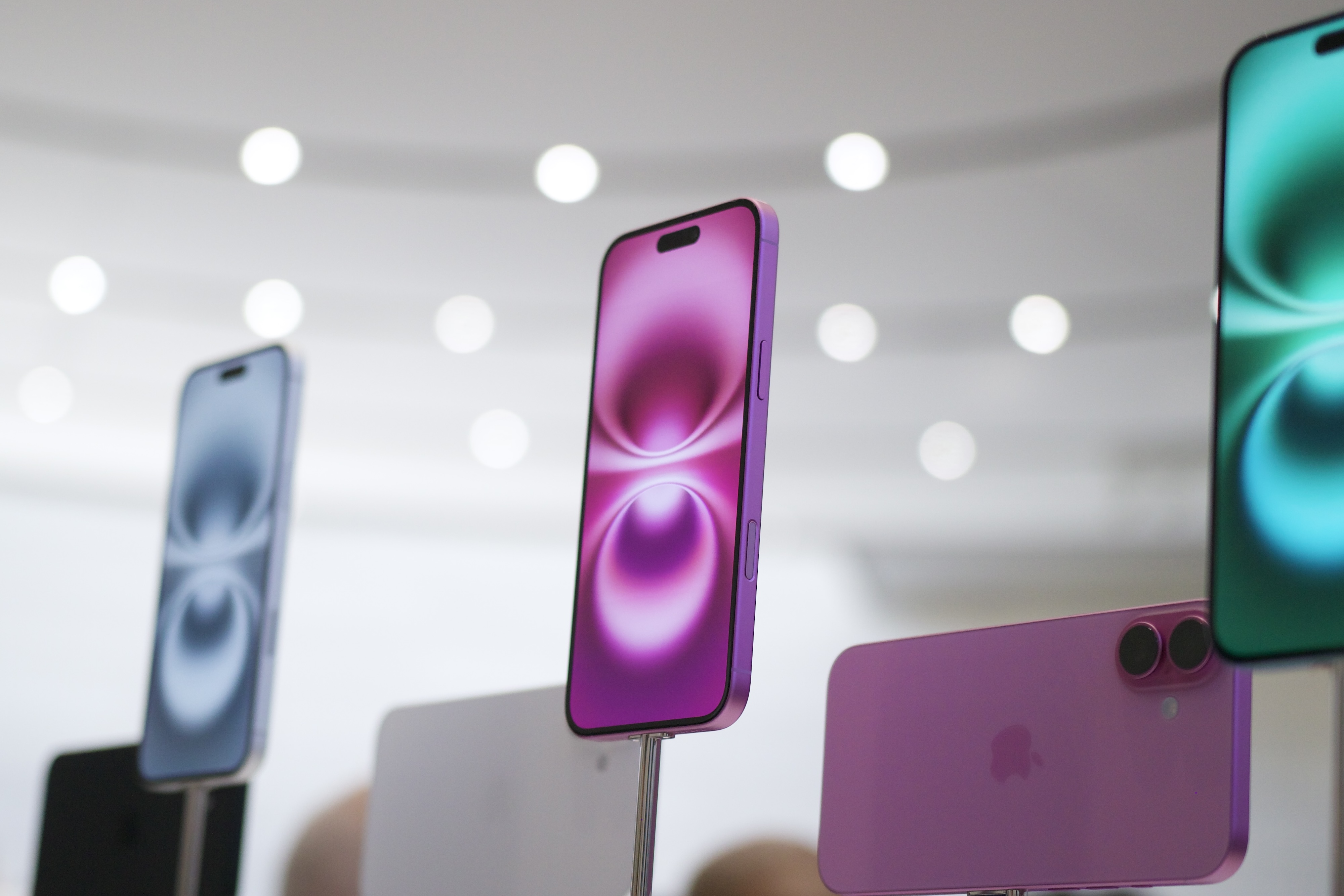
Apple has made iOS 18 a bit complex in terms of compatibility. While you can install iOS 18 on iPhones as far back as the iPhone XR, you’ll need at least an iPhone with the A17 Pro chip to get the new Apple Intelligence features. That means the iPhone 15 Pro and iPhone 15 Pro Max (and later) get the complete package for iOS 18.
The reasoning for this is due to the 8GB of RAM that the iPhone 15 Pro models have, as well as the performance offered by the A17 Pro. After all, AI typically requires a lot of power to run due to its large language models (LLMs), so this makes sense. Unfortunately, it means that even the iPhone 15 and iPhone 15 Plus, which are just over a year old, are already a bit dated since they don’t meet the minimum requirement threshold for Apple Intelligence.
Furthermore, Apple Intelligence works with all the new iPhone 16 models — including the iPhone 16, iPhone 16 Plus, iPhone 16 Pro, and iPhone 16 Pro Max. Apple Intelligence is a key selling point of the new lineup, so from this point forward, all iPhones should be able to utilize It.
There are still plenty of other features in iOS 18 that the older models can get too. We have a list of every iPhone compatible with iOS 18 if you need to double-check. As for iPads, you’ll need one with at least an M1 chip to enjoy iPadOS 18.
Apple Intelligence is here
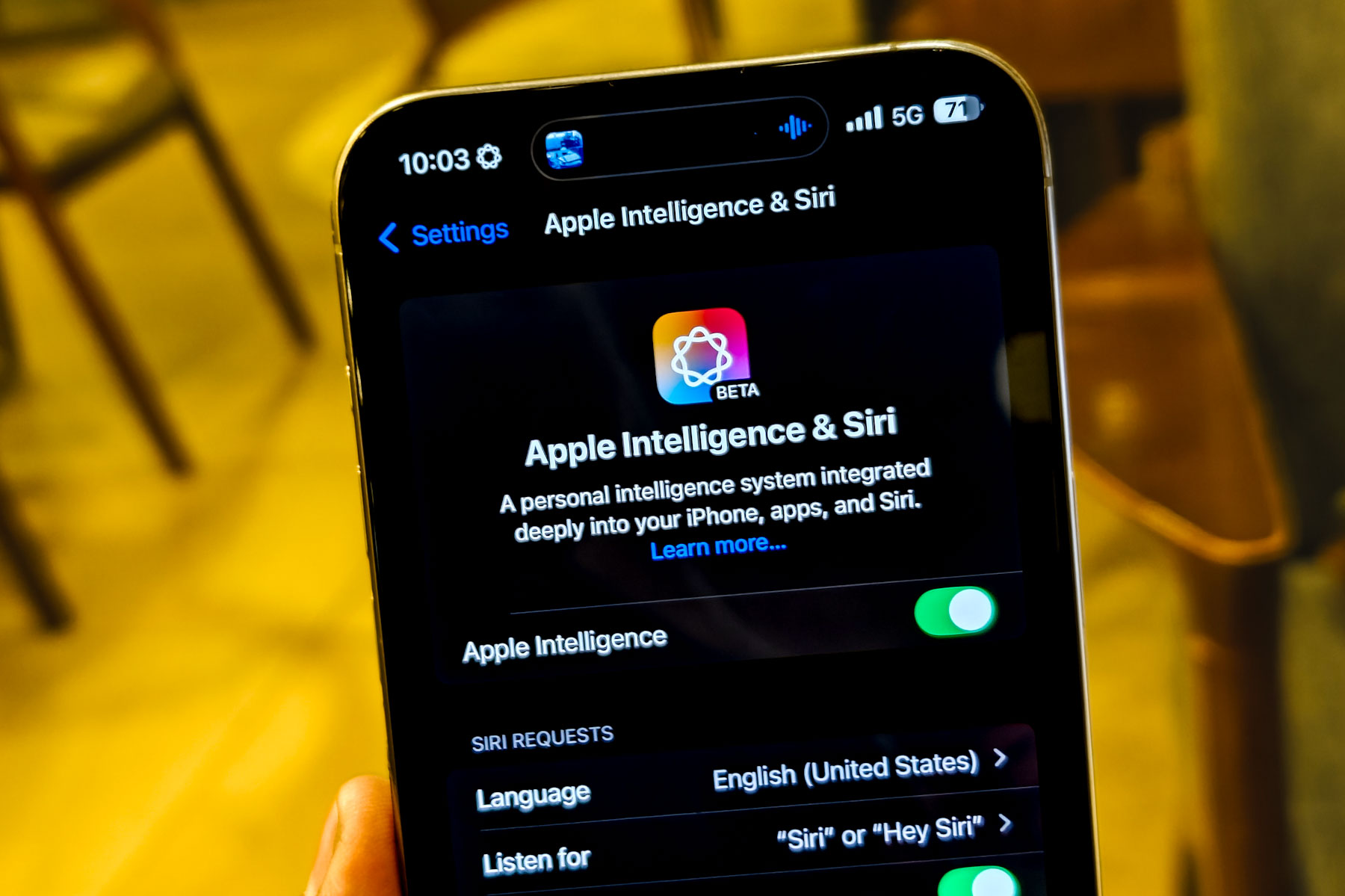
Apple Intelligence is a big part of iOS 18. Again, while many iPhones will be able to support iOS 18, not all of them will get the Apple Intelligence features. As mentioned, prior to the iPhone 16 series, the only two models that get Apple Intelligence are the iPhone 15 Pro and iPhone 15 Pro Max.
Apple has described its Apple Intelligence AI as “comprised of highly capable large language and diffusion models specialized for your everyday tasks.” It will draw on your personal context to provide you with assistance by understanding and creating language and images. It also lets you take various steps to simplify actions across multiple apps that you use daily.

Apple Intelligence can prioritize your notifications so that only the most crucial ones are at the top of the stack. A new Reduce Interruptions Focus feature means you will only see the notifications that require immediate attention.
There are also writing tools integrated into Apple Intelligence that should help you write better. The writing tools are integrated systemwide so that you can use them across both first- and third-party apps. Writing tools include rewriting, proofreading, and even text summarization.
Rewrite will do just that — rewrite what you’ve already written into a different version, perhaps with a different tone than you already had. Proofread helps you ensure there are no grammar or typo mistakes, and can provide edit suggestions. Summarize lets you select text and get a recap of crucial information in a more digestible way. Summaries can also be found in your email inbox, and Apple Notes can record and transcribe audio.
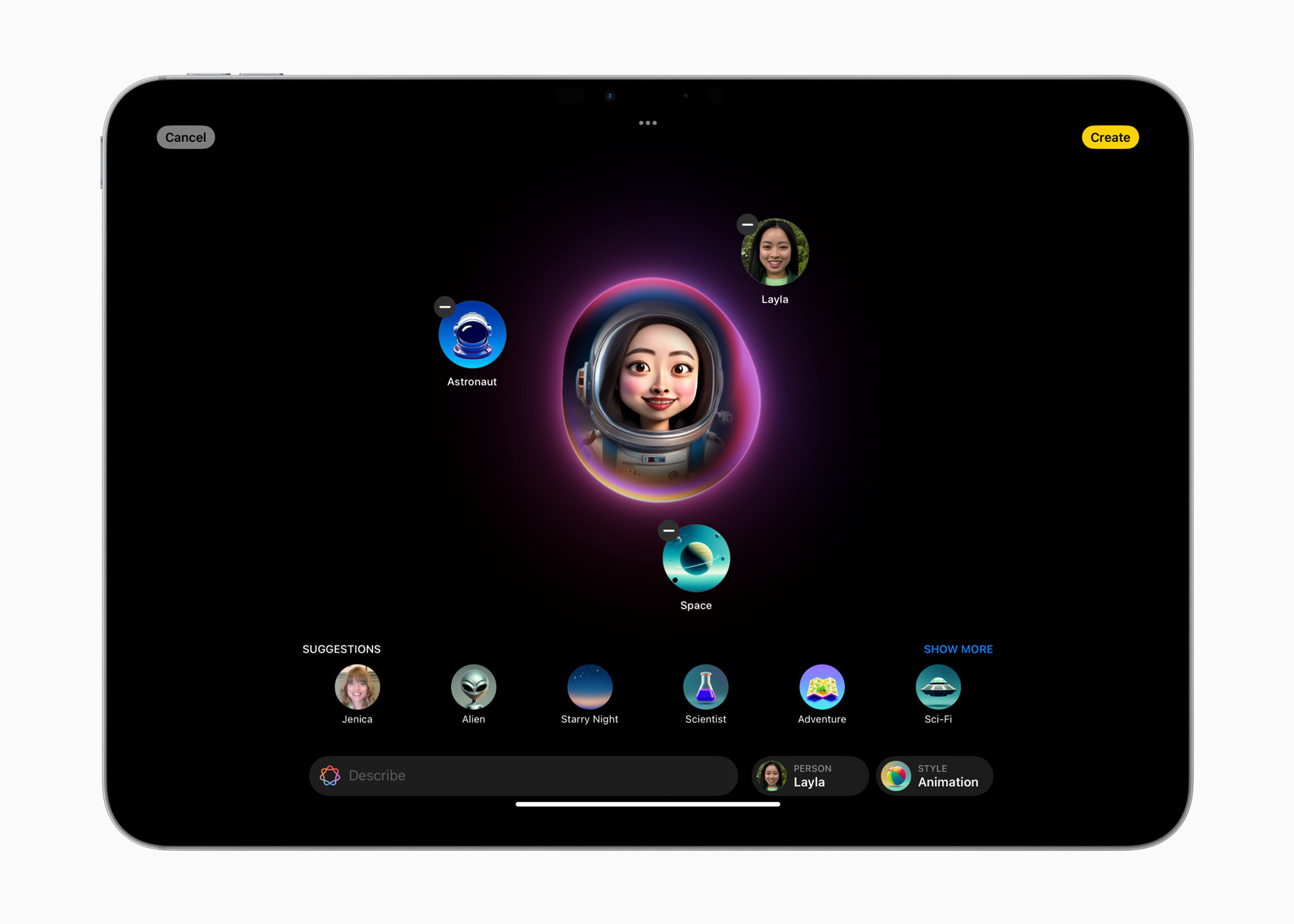
Image generation also plays a big part in Apple Intelligence and is now available for everyone in iOS 18.2. Apple has a new app called Image Playground, where you can “create” new and original images to express yourself in different ways. Image Playground is integrated right into the Messages app, other apps like Notes, and even third-party apps that utilize the Application Programming Interface (API). Alternatively, you can use the standalone Image Playground app.
Like creating your own images in the Image Playground, Apple Intelligence can also generate custom emojis with Genmoji. Just type in a descriptor, and Apple Intelligence whips up a personalized emoji based on what you described.
Siri also got a lot of new smarts with Apple Intelligence. With AI, Siri is able to better understand natural language and be more conversational. Siri should even be able to understand you even if you stutter and can maintain context from one request to another.
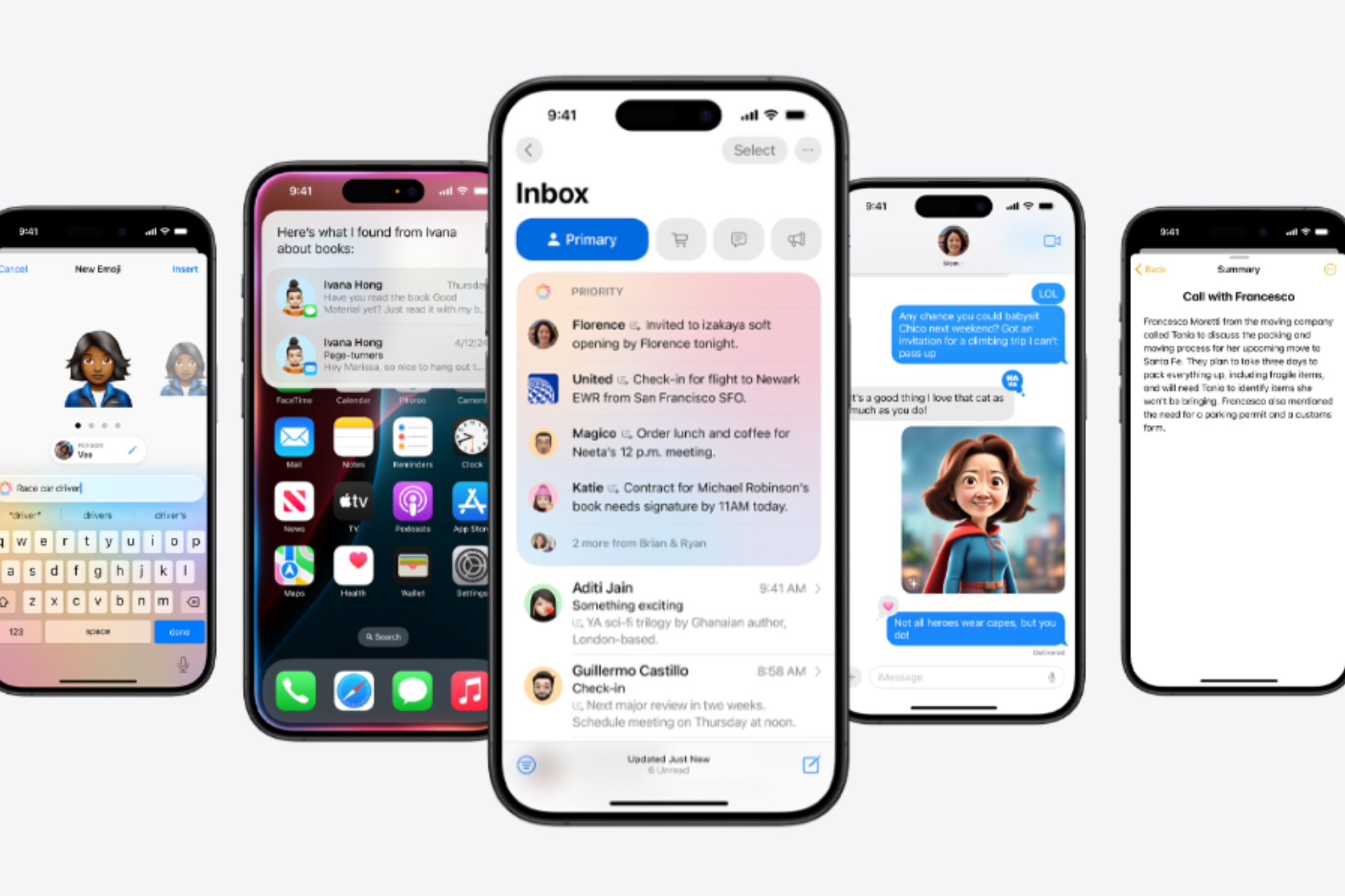
It will also have Apple product knowledge, so you could ask Siri for help on how to do something on your iPhone, iPad, or Mac. Lastly, Siri has on-screen awareness, so you can take action with Siri based on what’s currently on your screen.
Apple has ChatGPT integration baked into Apple Intelligence. If Siri is unable to complete your request, it will suggest ChatGPT to get you an answer — without ever having to switch apps. ChatGPT is also available through the writing tools.
Apple Intelligence also makes the Clean Up tool in Photos possible, which we’ll get to in a bit. It’s Apple’s version of Google’s Magic Eraser and Samsung’s Object Eraser tools. Searching is faster and easier through your photos and videos with natural language, and you can even create new memory videos with a phrase.
Though iOS 18 was first available in September, it did not ship with Apple Intelligence features initially. Beginning with iOS 18.1, Apple added a handful of Apple Intelligence features like Writing Tools, improved Siri, improvements to searching memories in Photos and the Clean Up tool, and call recording with transcriptions.
On December 11, 2024, Apple released iOS 18.2 to the public. This update includes all the image generation tools in Image Playground, including Genmoji and ChatGPT integration, which are available through Siri and Writing Tools. For those who have an iPhone 16 device, iOS 18.2 also adds Visual Intelligence through the Camera Control, and iPhone 16 Pro and Pro Max users also get Layered Recordings in Voice Memos.
Visual Intelligence

At the iPhone 16 event, Apple introduced the new Camera Control and a feature called Visual Intelligence. This is a new tool in Apple Intelligence that’s only available on the iPhone 16, iPhone 16 Plus, iPhone 16 Pro, and iPhone 16 Pro Max devices.
Visual Intelligence is basically Apple’s take on Google Lens. To activate Visual Intelligence, just press and hold the Camera Control button and then point the camera at any object in the real world. Some use cases for this are to identify animals or plants, add event flyer details to your calendar, find out where you can purchase a cool object like a bike you see outside, and more.
This is a big selling point for the new iPhone 16 line, making the Camera Control button more useful than initially. Visual Intelligence is now officially available with the iOS 18.2 update.
Lots of new customization options

Among the big features of iOS 18, aside from Apple Intelligence, are the new customization options. For the first time, iPhone users are able to customize their home screens similarly to how those on Android can.
With iOS 18, users can place their apps and widgets anywhere on the home screen grid. Previously, you’d have to use some workaround apps or the Shortcut app to create a “blank” icon to place in between app icons to create a space. Now, iOS 18 lets you put those icons and widgets in any space you’d like. This will open up a whole new world of home screen customization and bring it even closer to Android than ever before.
Not only that, but Apple now has a “dark mode” theme for app icons as well. If you have dark mode enabled on your iPhone with iOS 18, your app icons get a dark-themed overlay to make home screen icons easier on the eyes. There is also a new app icon tinting feature that lets you change the icons’ color to match your wallpaper or whatever color you feel like using.
Finally, if you don’t like the size of the app icons and widgets, you can adjust their size to make them larger. It’s a lot of extra tools, and it’s all very good news for customization fans.
A redesigned Control Center

Control Center has remained the same for many years, but iOS 18 gave it a much-needed revamp.
The Control Center now has even more controls available to you, which you can add as you see fit. You can rearrange the order of the controls, even the default options, and you can now have multiple pages and groups of controls. Developers can also create controls for their apps that you can add in the Control Center, and you can adjust the sizing for each control according to your preferences.
Lastly, you can swap out the lock screen controls for whatever you want, including third-party apps that are supported. So you are no longer stuck with just the flashlight and camera. The Action button can also be used to access the new controls.
Big changes to Apple Photos

Apple is giving Photos a big refresh this year with iOS 18.
With Apple Photos, you’ll have a new unified view rather than separate tabs and sections. The Photo Library will still be the main focus, and to view additional content, you just swipe down. The extra content includes collections of images that would be under the For You tab from before, as well as any albums that you created.
The new Photos app has new filter and sorting options, which can help you find what you’re looking for faster. The sorting options include recently added or by capture date. The filters include Favorites, Edited, Photos, Videos, and Screenshots. Once a filter is selected, it will display your items in that category.
A big focus of the new Photos app is Collections. These are “smart” groups of photos and videos based on subject, location, type, and other parameters in the metadata. In iOS 18, you can change the order in which these collections appear under the Photo Library grid or even remove a collection entirely. If you like a Collection, it can be pinned for easy access.
As mentioned briefly, Apple Intelligence is in the Photos app as well. If you’re using an iPhone that supports Apple Intelligence, you’ll have access to the new Clean Up photo-editing tool, which will get rid of unwanted people and objects in your photos. The search is also improved to understand natural language and get more specific search results. Lastly, Memory Maker uses Apple Intelligence to create a custom Memory Movie using existing photos and videos by just entering a prompt.
Lots of new Messages features

The Messages app got some big improvements as well with iOS 18.
The most significant change is the support of RCS messaging for better communication between iPhone and Android users. With RCS messaging, you get end-to-end encryption, read receipts, typing indicators, and — best of all — higher-quality image and video transfers. So, when your Android-using friend sends you a video, it will no longer be a blurry, pixelated mess the size of a postage stamp! RCS messages will still have green bubbles, though.
Other updates for Messages include rich text formatting, new animation styles, and the ability to send texts via satellite, use any emoji or sticker as a Tapback reaction, and the ability to schedule text messages for later. If you have an iPhone with Apple Intelligence, you can also use Image Playground to generate contextual images and create personalized Genmoji.
Your iPhone has a new password manager
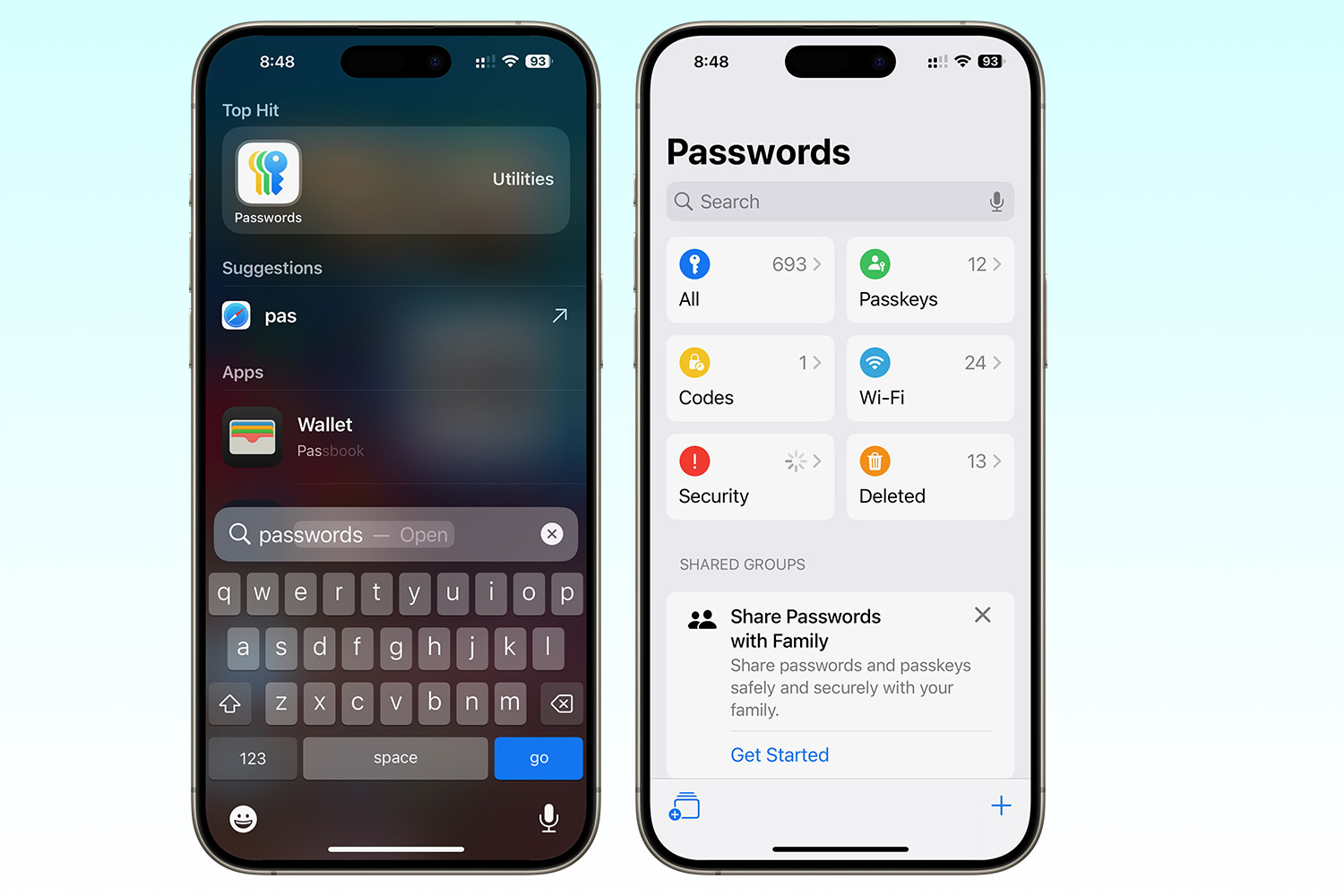
While Apple has allowed users to keep passwords stored in Keychain for the past few years, accessing those saved passwords was a bit difficult with Keychain tucked away in the Settings app. Thankfully, that’s a bit easier on iOS 18 with the new Passwords app.
The Passwords app has a layout similar to the Reminders app, with category tiles and a search bar at the top. If you have already been using Keychain, then all of your saved logins and passwords will be here, and you can just authenticate with Touch ID or Face ID.
Once you select a password to view, it will show you things like site or app name, username, login, verification code, websites, notes, and more. You can add a new entry at any time, delete existing passwords, edit them, and even sort them by date edited or created, website, or title.
All passwords in the Passwords app will be synced via iCloud Keychain, and you can access the Passwords app on your iPhone, iPad, Apple Vision Pro, and Mac. Apple is also adding a Passwords app to iTunes for Windows at a later date.
Those who use other password manager apps, like 1Password or LastPass, will be able to import their passwords later, but Apple has not set a solid date for that feature just yet.
Other updates/features in iOS 18
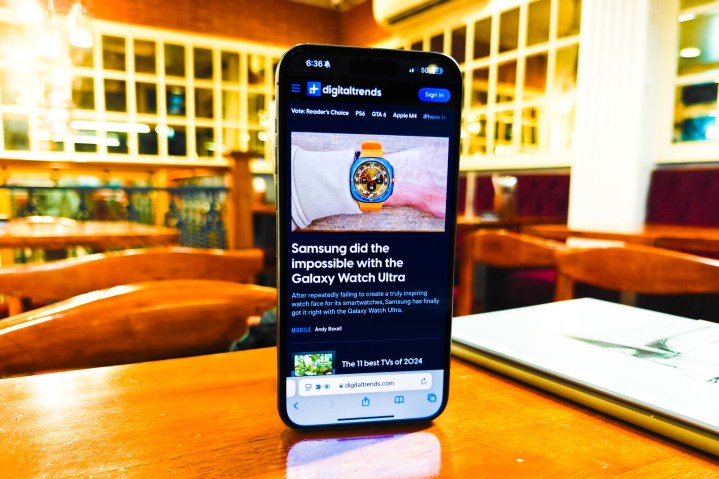
As you can see, iOS 18 is packed with changes, but we just went over the biggest ones. Here’s a quick rundown of some smaller ones to also keep an eye out for.
The Mail app has a new Primary category in the unified inbox that will focus on time-sensitive emails from those who matter the most to you. It will also group emails from the same sender, such as receipts, marketing emails, and newsletters from one company.
Safari features Highlights, which detects relevant information on a page and highlights it while you browse it. The Reader view has also been redesigned to be smarter, with a table of contents and high-level summarization. We have a closer look at all of the Safari changes.

In Maps, you can download topographical maps and trail networks, save hikes for offline access, and even create custom walking and hiking routes. For gamers, the new Game Mode maximizes your device’s performance by minimizing background activity and sustaining consistently high frame rates. This mode also dramatically reduces audio latency when using AirPods, making wireless game controllers more responsive.
Apple Wallet now has Tap to Cash, which lets you bring your iPhone up to another iPhone to send money with Apple Cash instantly. There is also support for reward programs and installment plans in Apple Wallet, as well as redesigned event tickets that include an event guide.
HomeKit users get some cool new things with the Home app, such as grant specific controls with guest access and hands-free unlock with Express Mode. Finally, eligible Pacific Gas and Electric Company customers can view their home electricity usage directly in the Home app.



